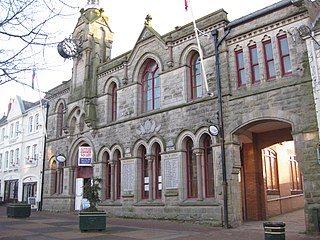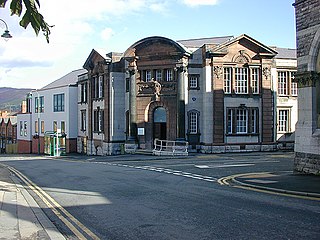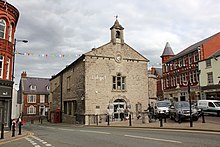
Barry Council Office and Library is a local government building and public library located in King Square, Barry, Wales. The building, which was once the meeting place of Barry Municipal Borough Council, is a Grade II listed building.

Cowbridge Town Hall is a public building in the High Street of Cowbridge in South Wales. The town hall, which is the meeting place for Cowbridge with Llanblethian Town Council, and also houses the town clerk's office, the committee rooms and the Cowbridge Museum, is a Grade II* listed building.

Ruthin Town Hall is a municipal facility in Market Street, Ruthin, Denbighshire, Wales. It is a Grade II listed building.

Pontypool Town Hall is a municipal structure in Hanbury Road, Pontypool, Wales. The town hall, which forms the original part of a civic centre that now serves as the headquarters of Torfaen County Borough Council, is a Grade II listed building.

Llandudno Town Hall is a municipal structure in Lloyd Street, Llandudno, Wales. The town hall, which serves as the meeting place of Llandudno Town Council, is a Grade II listed building.

Maesteg Town Hall is a municipal structure in Talbot Street, Maesteg, Wales. The town hall, which was the headquarters of Maesteg Borough Council, is a Grade II listed building.

The Shire Hall is a municipal structure in Glanhwfa Road, Llangefni, Anglesey, Wales. The building, which served as the headquarters of Anglesey County Council, is a Grade II listed building.

Montgomery Town Hall is a municipal building in Broad Street, Montgomery, Wales. It served as the meeting place of Montgomery Borough Council and is a Grade II* listed building.

Mold Town Hall is a municipal structure in Earl Road in Mold, Wales. The town hall, which serves as the meeting place of Mold Town Council, is a Grade II listed building.

Holywell Town Hall is a municipal structure in the High Street in Holywell, Wales. The façade of the town hall, which is the only surviving part of the original structure, is a Grade II listed building.

Llandovery Town Hall is a municipal building in Market Street, Llandovery in Carmarthenshire, Wales. The structure, which is used as the local public library, is a Grade II listed building.

Llanidloes Town Hall is a municipal building in Great Oak Street, Llanidloes in Powys, Wales. The structure, which is the meeting place of Llanidloes Town Council as well as the home of the Llanidloes Museum and the Llanidloes Public Library, is a Grade II listed building.

Cardigan Guildhall, is a municipal building in Pendre, Cardigan, Ceredigion, Wales. The structure, which is now used as an art gallery and community events venue, is a Grade II* listed building.

Llangollen Town Hall, is a municipal building in Castle Street, Llangollen, Denbighshire, Wales. The structure, which is the meeting place of Llangollen Town Council, is a Grade II listed building.

Welshpool Town Hall, is a municipal building in Broad Street, Welshpool, Powys, Wales. The structure, which is the meeting place of Welshpool Town Council, is a Grade II listed building.

County Hall is a municipal building in Wynnstay Road, Ruthin, Denbighshire, Wales. The structure is the headquarters of Denbighshire County Council.

Pwllheli Town Hall is a municipal building in Penlan Street, Pwllheli, Gwynedd, Wales. The structure, which now operates as an arts centre, is a Grade II listed building.

Tenby Town Hall is a municipal building in the High Street, Tenby, Pembrokeshire, Wales. The structure, which is used as an events venue, is a Grade II listed building.

Fishguard Town Hall is a municipal building in the Market Square, Fishguard, Pembrokeshire, Wales. The structure, which is the meeting place of Fishguard and Goodwick Town Council, is a Grade II listed building.

Colwyn Bay Town Hall is a municipal building located on Rhiw Road in Colwyn Bay in Conwy County Borough in Wales. The structure, which accommodates Colwyn Bay Town Council, is a Grade II listed building.






















